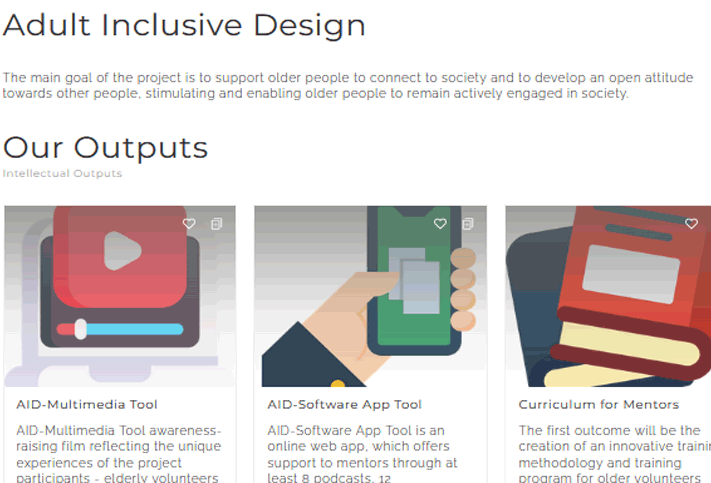
| Short descriptor of good practice |
| The main goal of the project is to support older people to connect to society and to develop an open attitude towards other people, stimulating and enabling older people to remain actively engaged in society. Other goals of the project: · to stimulate and enable older people to remain actively engaged in society, · to foster the elderly to carry out volunteering activity, · to facilitate the learning process of the mentors who will be multipliers at a local level on the topic of an inclusive approach, · to increase the ability to understand and empathize with others, · to create an innovative training methodology and training program for older volunteers supporting the integration of disadvantaged groups · to develop volunteering innovative method, which all partners can use, · to raise digital competencies of those who work with the different target groups of vulnerable adults (50+) and staff of companies and organizations, · to increase the social integration through ICT skills, · to improve the skills of teaching staff at participating institutions. |
| Type of setting where good practice is delivered |
| Adult education (University), NGO, public research center |
| Time Frame for delivery of good practice |
| Workshop plans are divided in 10 sessions. Session 1: Introduction – Let’s get to know one another (1,5-2 hours) Session 2: Hopes and expectations (1,5-2 hours) Session 3: Theory and key concepts of mentoring (90-120 minutes) Session 4: Facilitating the matchmaking process (120 minutes) Session 5: To map assets of knowledge and skills (1,5 hours) Session 6: Contingency plan (1,5 hours) Session 7: Self-presentation – Where we are from, where we are going (2 hours) Session 7: Bulding trustful relationships (1,5 hours) Session 7: Mentoring on giant’s shoulders? (90 minutes) Session 7: Taking a leap of (cultural) faith (2-3 hours) Session 8: My talents – discovering myself (1,5 hours) Session 8: What’s up? Bring social inclusion into everyday life of migrants (1,5 hours) Session 8: Basic language learning through game–based activities (2-3 hours) Session 8: Establishing and maintaining boundaries (90 minutes) Session 9: Tips for successful mentoring (1 hours 15 minutes) Session 10: Conclusions (40 minutes) |
| Type of learner the best practice is supporting |
| 1.Trainers from partner organizations, who learned about interesting and pragmatic opportunities to use digital technologies in training as mentors for older people. 2. Seniors participating in educational activities of partner organizations |
| Resources used as part of good practice |
| Project reference: 2020-1-ES01-KA204-082640 https://erasmus-plus.ec.europa.eu/projects/search/details/2020-1-ES01-KA204-082640 Website: http://aidweb.eu/ AID web-app tool: https://aidweb-app.eu/ |
| Aims and objectives of good practice |
| The project activities were centered around the objectives of: 1. Improving the mentoring and volunteering skills of older people. 2. To prepare the staff of the partner organizations to carry out attractive activities to improve social integration. 3. To develop a new approach, a new formula for teaching older people how to use their skills and put them at the service of others. Preparation of the publication “Volunteering as a means to improve the quality of life of older people – Innovative Guide for Trainers”. Innovative Guide for Trainers”, the AID-Software App platform and the video motivations. |
| Evidence as to why this was considered good practice |
| Seniors can be a special group of volunteers who have a significant amount of free time and what is most valuable – knowledge and experience. Volunteering can be used as a source of improved quality of life for seniors. The project was consisted from 4 partners from different countries. It developed mentor training scheme, AID-Software App Tool and AID-Multimedia Tool which increased digital competences of persons working with different target groups, increased ability to understand and emphathise with others, Promote social integration through ICT skills and improve competences of teaching stuff of participating institutions. |
| 3 Key learning Principles that were used in this good practice to support senior learners |
| 1. Volunteering and collaborative learning 2. Active learning and engagement 3. Relevance |
| Any additional learning that we can take from this good practice example |
| AID web-app offers 3 different modules where you can explore many ways of learning – AID Motivational Course for Volunteers, Space for Social Interaction and Space for Amusement. |
| Any Additional Information |
| / |
